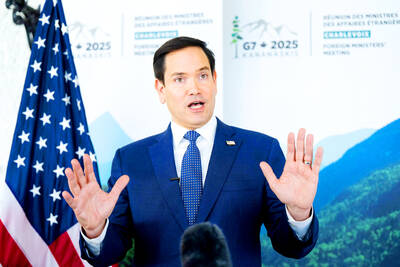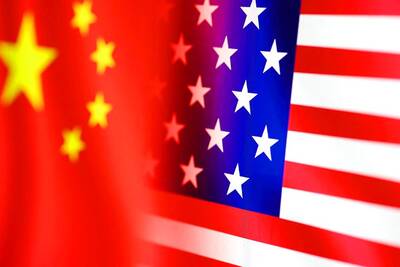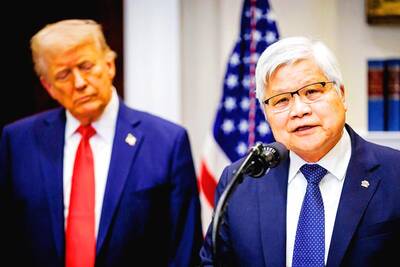The euro hit a four-year low yesterday on fears that austerity measures would stifle recovery, as European finance ministers prepared to discuss tighter regulation a week after launching a US$1 trillion rescue plan.
German Chancellor Angela Merkel said on Sunday the rescue package had only bought the eurozone time to tackle its basic problem — a yawning gap between its strongest and weakest economies.
The euro slumped to a four-year low on Asian markets yesterday — hitting US$1.2243, its lowest point since April 2006 — after Friday's sell-off on Western markets, while investors sought safety in gold.
“It's the safe-haven thing. Gold doesn’t earn you any interest or dividends, but who cares? ... The eurozone is a house of cards,” a Europe-based gold trader said.
Bank shares in Greece, whose debt crisis prompted the rescue package aimed at stopping a spread to other vulnerable eurozone members and even destabilizing the global economy, tumbled 4 percent yesterday.
Greek Prime Minister George Papandreou was quoted as saying yesterday that he had written a letter to US President Barack Obama jointly with Merkel, French President Nicolas Sarkozy and Eurogroup chairman Jean-Claude Juncker on whether the market in credit default swaps should be closed.
Politicians have long called for tighter control of speculators, who they believe exacerbated Greece's borrowing problems by snapping up insurance that it could default.
However, Papandreou's call to consider closing the market for this insurance, known as credit default swaps, appeared to go further than anything demanded so far and would probably meet stiff opposition from companies and other bond buyers who depend on it to cover their risk
Papandreou's remarks come ahead of the meeting of European finance ministers in Brussels that is set to sign off tougher controls for hedge funds and private equity.
Britain has long sought to water down these rules although it is now possible that countries such as Germany and France will overrule London in a vote, forcing it to accept a stricter regime.
Also See: After a turbulent few weeks, the EU makes an historic gamble

‘CROWN JEWEL’: Washington ‘can delay and deter’ Chinese President Xi Jinping’s plans for Taiwan, but it is ‘a very delicate situation there,’ the secretary of state said US President Donald Trump is opposed to any change to Taiwan’s “status quo” by force or extortion and would maintain that policy, US Secretary of State Marco Rubio told the Hugh Hewitt Show host on Wednesday. The US’ policy is to maintain Taiwan’s “status quo” and to oppose any changes in the situation by force or extortion, Rubio said. Hewitt asked Rubio about the significance of Trump earlier this month speaking with Taiwan Semiconductor Manufacturing Co (台積電) chairman C.C. Wei (魏哲家) at the White House, a meeting that Hewitt described as a “big deal.” Asked whether the meeting was an indication of the

‘RELATIVELY STRONG LANGUAGE’: An expert said the state department has not softened its language on China and was ‘probably a little more Taiwan supportive’ China’s latest drills near Taiwan on Monday were “brazen and irresponsible threats,” a US Department of State spokesperson said on Tuesday, while reiterating Washington’s decades-long support of Taipei. “China cannot credibly claim to be a ‘force for stability in a turbulent world’ while issuing brazen and irresponsible threats toward Taiwan,” the unnamed spokesperson said in an e-mailed response to media queries. Washington’s enduring commitment to Taiwan will continue as it has for 45 years and the US “will continue to support Taiwan in the face of China’s military, economic, informational and diplomatic pressure campaign,” the e-mail said. “Alongside our international partners, we firmly

KAOHSIUNG CEREMONY: The contract chipmaker is planning to build 5 fabs in the southern city to gradually expand its 2-nanometer chip capacity Taiwan Semiconductor Manufacturing Co (TSMC, 台積電), the world’s biggest contract chipmaker, yesterday confirmed that it plans to hold a ceremony on March 31 to unveil a capacity expansion plan for its most advanced 2-nanometer chips in Kaohsiung, demonstrating its commitment to further investment at home. The ceremony is to be hosted by TSMC cochief operating officer Y.P. Chyn (秦永沛). It did not disclose whether Premier Cho Jung-tai (卓榮泰) and high-ranking government officials would attend the ceremony. More details are to be released next week, it said. The chipmaker’s latest move came after its announcement earlier this month of an additional US$100 billion

Authorities yesterday elaborated on the rules governing Employment Gold Cards after a US cardholder was barred from entering Taiwan for six years after working without a permit during a 2023 visit. American YouTuber LeLe Farley was barred after already being approved for an Employment Gold Card, he said in a video published on his channel on Saturday. Farley, who has more than 420,000 subscribers on his YouTube channel, was approved for his Gold Card last month, but was told at a check-in counter at the Los Angeles International Airport that he could not enter Taiwan. That was because he previously participated in two